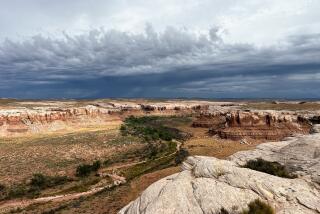White House Drops Plan for Land-Use Fees
- Share via
WASHINGTON — Under pressure from western Democratic senators, the Clinton Administration has dropped budget proposals calling for sharply increased grazing fees and the introduction of steep royalties on hard-rock minerals mined on public lands.
Administration officials characterized the move as a switch in tactics, insisting that they still support both proposals. But some angry environmentalists called it a retreat from two of the White House’s most loudly advertised reform initiatives.
Initially, the Administration proposed to collect an additional $48 million over the next four years in fees paid by ranchers who run their cattle on public lands in the West. It also called for a 12% royalty on the gross proceeds of hard-rock minerals taken from public lands, a levy that it estimated would bring the government $471 million over four years.
But after a staunch protest from Democratic Sens. Max Baucus of Montana, Ben Nighthorse Campbell of Colorado, Jeff Bingaman of New Mexico, Dennis DeConcini of Arizona and Harry Reid of Nevada, the Administration agreed to remove the initiatives from its budget package.
Interior Department spokesman Jay Ziegler said the Administration instead will support the imposition of mineral royalties as part of broad mining-reform legislation now before Congress. He said that Interior Secretary Bruce Babbitt plans a series of hearings in the West to determine how to proceed on grazing-fee increases.
The development brought a stinging reaction from the Wilderness Society, one of the main-line environmental organizations lobbying for reforms in public-resource use.
“They’ve run up the white flag before the battle’s even begun,” said Wilderness Society spokesman Mike Francis. “They came out swinging in the right direction and got the environmental community behind them. At the first sign of the enemy on the horizon, they wilted from the battlefield.”
California Rep. George Miller (D-Martinez), chairman of the House Natural Resources Committee, called the Administration’s decision a “fundamental mistake” and said he would defer committee action on mining reform, planned for next month, until the Senate acts on the issue. The reforms’ removal from the budget package, he said, “sends the message that business as usual has lived to fight another day.”
Administration officials suggested that the new course offers a better chance of success than pressing the reforms as part of the budget package that the White House will present to Congress in early April.
But Wilderness Society Vice President Don Hellmann disagreed. “It would be easier to pass these as part of a package where everybody shares the pain,” he said. “We fear that when these issues are separated, they will be whittled down until they are unrecognizable.”
In a March 9 letter to Clinton, the five Democratic senators argued that the Administration’s proposed reforms “would harm the economies of the farm belt and the American West.”
“With its heavy cuts in the current farm program and increased fees on extractive resource industries, we believe the plan, in its current form, would have a disproportionate negative impact on our home states,” the letter stated.
Subsequently, the group met with White House Chief of Staff Thomas McLarty, and on Monday the senators were advised that the grazing and mining initiatives had been dropped from the budget package.
“The original Clinton plan was unfair to the West,” Baucus said in a prepared statement. “It called for dramatic increases in grazing fees, the elimination of below-cost timber sales, and new fees on mining. But after some weeks of consultation, President Clinton has recognized the adverse impact that his plan would have on Montana and other western states and has moved boldly to address this injustice. Grazing fees, below-cost timber sales, and mining royalties have all been removed from the President’s budget plan.”
The senators were to meet with McLarty again late Tuesday to discuss the future of the initiatives now that they have been excised from the budget.
In the initial mining-royalty plan, the Administration proposed a fee of 12% on gross proceeds from minerals mined on public lands. Separate mining-reform legislation sponsored by Sen. Dale Bumpers (D-Ark.) calls for royalties of 8% on gross proceeds.
But the five senators proposed a 4% royalty on net mineral proceeds. That amount, supporters of the Bumpers bill maintain, would be tantamount to no fee at all, since companies can use various tax loopholes to avoid reporting any net profits from their operations.
More to Read
Sign up for Essential California
The most important California stories and recommendations in your inbox every morning.
You may occasionally receive promotional content from the Los Angeles Times.










